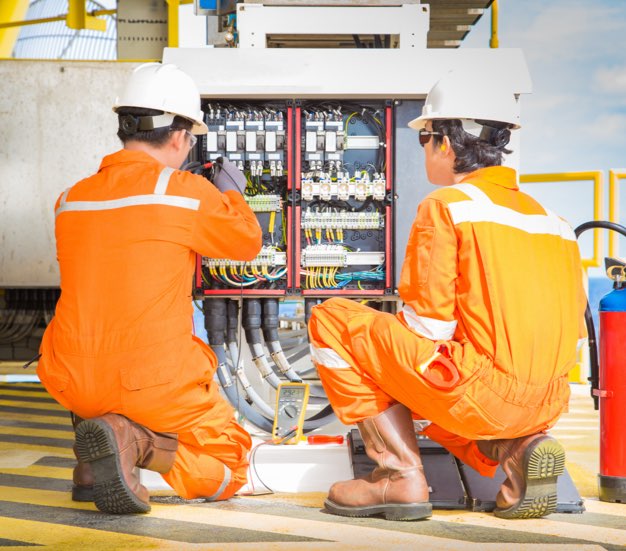
Instrumentation & Electrical Technology
Launch a career in one of the Gulf Coast's most in-demand industries with College of the Mainland’s Instrumentation & Electrical (I&E) Technology program.
Our hands-on training prepares you to install, maintain and troubleshoot complex instrumentation and electrical systems used across refineries, chemical plants, and industrial facilities.
Whether you're starting from scratch or upgrading your skills, our flexible pathways help you move from entry-level roles to highly skilled technician positions.
Why Choose I&E at COM
- High Demand, High Pay: Prepare for growing, high-wage careers in the Gulf Coast’s industrial sector.
- Flexible Learning: Earn stackable certificates or a full AAS degree.
- Fast Track Options: Begin working quickly with the Level 1 Certificate.
Choose Your Path
Level I Certificate
With a Level I Certificate in Instrumentation & Electrical (I&E) Technology, students are typically prepared for entry-level technician roles where they assist with the installation, maintenance, and troubleshooting of industrial instrumentation and electrical systems.
Level I Certificate Degree Plan
Level II Certificate
A Level II Certificate in Instrumentation & Electrical (I&E) Technology prepares graduates for more advanced, hands-on roles in industrial settings. These jobs typically involve both instrumentation (measurement, control, automation systems) and electrical systems (wiring, troubleshooting, repair).
Level II Certificate Degree Plan
Associate of Applied Science
With an Associate of Applied Science (AAS) in Instrumentation & Electrical Technology, graduates are prepared for a variety of skilled technician and technologist roles in industries that rely on automated systems, process controls and electrical infrastructure.
I&E Technology Jobs in Industries
- Oil & Gas
- Petrochemical Plants
- Power Generation
- Water/Wastewater Facilities
- Food & Beverage
- Manufacturing
- Aerospace
- Utilities & Refineries
Jobs Typically Involve
- Installation and Calibration: Setting up and calibrating instruments like sensors (temperature, pressure, flow, etc.) and control systems.
- Maintenance and Repair: Performing routine maintenance and troubleshooting malfunctions in electrical and instrumentation systems.
- Troubleshooting: Diagnosing issues with instruments, control systems, and electrical equipment to identify root causes and implement solutions.
- Documentation: Keeping accurate records of maintenance, repairs, and calibrations.
- Safety: Ensuring all work is performed safely and in compliance with relevant regulations.
Program Details
Start Date
Fall 2025
Learning Format
Face-to-Face
Program Length
Level 1 Certificate:
2 semesters
Level 2 Certificate:
3 semesters
AAS: 4 semesters
Degree Plan
View in course catalog
Let’s Connect!
 409-938-8286
409-938-8286 outreach@com.edu
outreach@com.edu
Career Insights
Occupational summary for Instrumentation & Electrical Technology
4,680 Regional Jobs
(2029 forecast)
8% Projected Regional Growth
$44,000 yr Median Salary
(Regional Average)
Additional Program Info
Financial Aid and Scholarships Available
| Event | Date |
|---|---|
| Next Start Date | Fall 2025 |
| Registration Opens | April 2025 |
| Application Deadline | August 15, 2025 |
- Apply to COM via ApplyTexas and select "Instrumentation & Electrical Technology".
- Meet with an advisor or enrollment coach to make sure you meet all program requirements.
- Choose Your Path:
- AAS – 4 semesters; 60 credit hours
- Level I Certificate – 2 semesters, 22 credit hours
- Level II Certificate – 3 semesters, 44 credit hours
Southern Association of College and Schools Commission on Colleges (SACSCOC) – Approved.
Program designed to meet industry standards and prepare for NCCER or ISA certifications.
- Can I work while I’m in the program?
-
Yes, flexible class options are available for working students.
- Does the program offer hands-on lab training?
-
Yes, labs are scheduled each semester and simulate real industrial environments.
- Is financial aid available?
-
Financial aid may be available for students in the program. Visit our financial aid page to learn more about the assistance available.
- What are the job opportunities with a Level I Certificate in I&E?
-
- Instrumentation or Technician Helper – Assist with I&E tasks and basic electrical work.
- Plant Maintenance Assistant – Support maintenance during outages or routine operations.
- Electrical Assembler – Help build and wire control panels.
- Calibration Assistant – Perform basic calibration under supervision.
- Facilities Maintenance Tech – Entry-level I&E support in industrial settings.
- Oilfield Services Tech – Assist with I&E functions at oilfield sites.
- What are the job opportunities with a Level II Certificate in I&E?
-
- Instrumentation or Electrical Technician – Install and maintain I&E systems.
- I&E Technician – Perform both electrical and instrumentation tasks.
- Control Systems Technician – Work with automation and control systems.
- Maintenance Technician – Conduct routine and emergency I&E maintenance.
- Automation or Field Service Technician – Support automated systems and provide on-site service.
- What are the job opportunities with an AAS in I&E?
-
Graduates with an Associate of Applied Science (AAS) degree may qualify for roles such as:
- Instrumentation Technician – Install and maintain process monitoring equipment.
- Electrical Technician – Service industrial electrical systems and controls.
- Controls/Automation Technician – Work with PLCs, DCS and automation systems.
- Electronics Technician – Support integrated electronic and mechanical systems.
- Maintenance Technician – Handle combined electrical, mechanical and instrumentation tasks.
- Calibration Technician – Ensure accuracy of measurement tools.
- Field Service Technician – Provide on-site I&E system support.
- Process/Plant Technician – Operate and troubleshoot equipment with I&E focus.
- Automation Specialist – Assist with automation design and optimization.
- How long is the program?
-
Level I Certificate: 2 semesters (24 credit hours)
Level II Certificate: 3 semesters (44 credit hours)
Associate of Applied Science (AAS) Instrumentation & Electrical Technology: 4 semesters (60 credit hours)
- Do I have to have all my immunization completed before I apply?
-
For students who are 21 years old and younger, submit current meningitis vaccination records, which can be submitted via email to admissions@com.edu or the Upload Documents Portal.
Vaccinations must be no more than five years old and must be administered more than 10 days before the start of classes.
If students are unable, or unwilling, to provide vaccination records, they may complete a vaccination waiver. This waiver must also be sent to admissions@com.edu.
